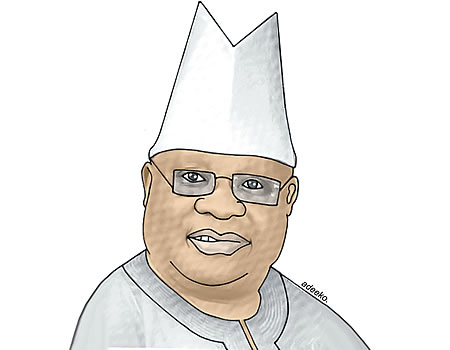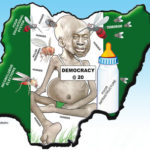The Osun State governorship litigation poses moral and legal burden, not only on the Supreme Court justices, but also the entire judicial and political establishment in the country. Why? The judges who will review two previous judgments are confronted with a case dwelling on the tripod of facts, law and morality. Members of the public, expectant with keen interest, are watching whether or not the apex court will retain its pivotal role as the core conscience of the polity.
From the beginning of the case at the election tribunal to the Appeal Court judgment, basic issue of facts law and morality have played up and are being deployed by both parties. The Supreme Court judges are now saddled with the task of sifting through the three planks to determine who is the winner of the governorship election.
We need national meeting to settle Nigeria’s national identity now —Obasanjo
Facts
On the issue of fact, the Osun case appears straightforward, as supported by actual trajectory of electoral event of September 2018. Candidate of Peoples Democratic Party (Ademola Adeleke, by satisfying the constitutional requirements of majority votes and one quarter of votes across two-thirds of the state’s local governments, won the election at the first ballot with 354 votes. Instead of declaring him winner, the state returning officer halted announcement of winner and came back to announce cancellation of seven polling units on the basis of which he declared the election inconclusive and ordered a rerun.
The first fact televised live nationally and internationally confirmed that Adeleke, indeed, won at the first ballot. Taken the facts further, the rerun was held in the seven units with the whole nation watching in horror the militarisation of the poll with violence unleashed on opposition members and voters with direct efforts at stopping pro-PDP voters.
There is a consensus that the rerun was not an election, but a violent electoral hijack on the basis of which the supposed winner was declared. If the winner of September 22 poll was denied victory in violation of the constitution, the rerun also denied his party, the PDP, fair opportunity to compete to determine the real winner of the election. The interesting thing about both September 22 and 27 polls was the populist attention devoted to the exercise by Nigerians.
Legal angle
Beyond the facts briefly analysed above, the legal battle was launched with a ferociousness never seen before. Adeleke filed a strong electoral petition with a top flight legal team headed by Dr Paul Ananaba, SAN, and Dr Onyechachi Ikpeazu, SAN. The defendants responded with equally forceful team, led by Wole Olanipekun, SAN and Akin Olujinmi, SAN.
During the weeks of fireworks, the petitioner called almost 85 witnesses, the defendants were able to call only 12, while the electoral commission could not call any witness to justify its cancellation of the September 22 poll, the cancellation of seven units’ results and the multiple electoral violations witnessed on September 27.
The petitioner had posited that by relevant sections of the constitution, Adeleke should have been declared winner of the election, as he clearly won at the first ballot.
Two, the petitioner contended that the state electoral officer had no power to cancel results of the seven units, as such should have been done by the presiding officers at the affected polling units. He then affirmed that the decision to cancel the seven units were illegal and, therefore, the rerun of September 27 was illegal and of no effect.
As to why the petitioner participated in the rerun, he contended that the action was in keeping with the electoral act as amended and several judicial decisions as election was not completed until a winner was announced.
Overall, the petitioner sought and got tribunal’s order to be returned as the rightful winner. This was also based on an unchallenged court decision which had struck down a clause in the electoral act which prohibited tribunal from declaring any petitioner winner of a disputed election. The judgment had ordered the clause deleted because it attempted to place a limit on judicial powers of the court.
From the defence’s side, certain basic legal points were rubbished by the defence team. The actual result of September 22 which showed Adeleke as winner was indisputable. The illegality of cancellation of the seven units to justify the rerun could also not be disputed by the defendants. The petitioner’s claim that election is a process completed when a winner is announced and his submission that you cannot challenge an election in which you are not a participant were both not demolished by the defence.
The tribunal judgment which returned Adeleke as the winner, based on the September 22 results, was based on facts and legal considerations. The majority judgment integrated facts known to the public and critical legal grounds to arrive at the decision. The minority judgment, on the other hand, ignored the facts of the case and dwelt mostly on legality which the petitioner argued were equally twisted to arrive at an end.
At the Appeal Court, the judgment appeared to ignore the facts and arrived at majority decision, not even on legal grounds, but on technicality. The majority judgment basically focused on issue of absence or attendance of the judge who delivered the tribunal majority judgment. The appeal lead judgment held, in contravention of the extant rules on disputed court records, that since the judge who delivered the majority judgment was not in court on that particular date, the judgment was invalid. The rule in disputed court records had requested the affected court to send in an affidavit to clarify the dispute. This was not done by the lead judges in clear breach of standard court procedure.
The lead judgment also breached known authorities and precedents by holding that that the appellant could not enjoy grace of September 22, since he had participated in the rerun. Several authorities and subsisting decisions faulted that categorisation. It is trite in law and there are precedents that you cannot challenge an election in which you did not participate. It is also a fact of law that election is not concluded until a winner is announced. So, the appellant acted right by participating in the rerun, because no winner was declared after the original poll. His participation at the rerun does not abolish his right conferred by his winning September 22 poll.
The morality of the case
A major part of the Osun drama was the question of educational qualificationof Senator Adeleke. Concurrent with the litigation is a fierce onslaught against the senator bordering on alleged forgery of school testimonial, among others. More than five cases have been instituted against the senator over the question of his qualification. In Abuja, the certificate question has become a weapon of blackmail to create a regime of morality far and beyond law in determining who actually won the 2018 election.
A bit of due diligence on what the real issue is about revealed certain facts. First, all the five cases on educational qualification dwell on the same subject, raising questions on why the multiple cases, if political witchhunt, blackmail and harassment are not the goal.
Second, the issue of qualification has been determined by two subsisting court judgments which affirmed Adeleke’s qualification to contest for governorship. Three, Adeleke submitted his secondary educational qualification for the election in question. He did not lie about his grades in subjects. In other words, there is nowhere the senator forged any result or certificate as being alleged.
Four, the West African Examination Council (WAEC), under oath and in an affidavit to an Abuja Court after a summon, confirmed that the senator sat the secondary school examination.
Five, the principal of his secondary school, under oath and in an affidavit to an Abuja High Court under court summons, affirmed that the senator was a student of the school who also sat the said examination.
Six, both WAEC and the school principal absolved the senator of forgery. And more importantly, the senator fulfilled constitutional requirement of being educated up to secondary school level to contest in the election.
If we are to interpret the last paragraph, we can arrive at certain conclusions. One, Adeleke did not forge any certificate or testimonial. Two, the cases on the issue are designed to malign, dent and soil his image as a governor-elect. Three, his educational qualification for the governorship was confirmed by the WAEC, the statutory educational body. Four, WAEC’s confirmation also attests to Adeleke’s compliance with constitutional demand that a candidate must be educated, at least, up to secondary school level.
In effect, the attempt to saddle Adeleke with a moral baggage fails in the face of facts of the case. If he had lied about his qualification, the smear campaign could have stuck. The senator was, however, honest enough unlike some prominent politicians.
In that case, on moral grounds, Adeleke triumphed because Osun people are not oblivious of his educational qualification before they voted for him on September 22.
Considering all the three planks on which the governorship battle is being fought, it is crystal clear that upholding the letter and spirit of the constitution supersedes all considerations. On facts of the matter, Adeleke is the true winner. On legal grounds, his appeal for the upholding of the tribunal judgment is foolproof. On moral ground, Adeleke is a victim of political persecution and witch-hunt designed to destroy his credibility and integrity. Despite the harassment, all facts affirm Adeleke’s innocence.
Beyond the above, the Supreme Court is the conscience of the nation. Our lord justices are not just law interpreters; their decisions are law. They embody the truth and facts of the constitution and people’s will.
What exactly does the constitution say?
Section 179 of the 1999 Constitution (as amended) (1), (2), (3), (4) and (5) provides how a winner for governorship must emerge. As of September 22, 2018, Senator Adeleke had already won the election and fulfilled the requirements of Section 179(2) (a) and (b) of the Constitution of the Federal Republic of Nigeria, supra, in respect of the Osun State governorship election. He won by 353 votes margin in the said election, having scored a total votes of 254,698, while Isiaka Oyetola scored 254,345 votes.
The only power that the presiding officer possess at the point of the announcement of the results was to declare the scores of candidates and return of a candidate, which shall be final subject to review by a tribunal or court in an election petition proceeding. This point is affirmed by Section 68 (1) (C) of the Electoral Act 2010 (as amended).
At the point of declaration of results, the returning officer acted ultra vires not to have returned Senator Adeleke. For parity of reasoning, the only time the returning officer has the power not to return a candidate is where two or more candidates poll equal number of votes being the highest in an election, which scenario was provided for under Section 70 of the Electoral Act, 2010 (as amended).This condition was not applicable on the Osun case.
Based on the collated scores of the candidates as announced by the returning officer at the end of the election of 22nd September, 2018, Senator Adeleke scored 254, 698 votes, while the Isiaka Oyetola, who was his closest rival, scored 254,345 votes. Premised on the foregoing, Senator Adeleke ought to have been returned , having scored majority of the lawful votes cast at the election as well as not less than one-quarter of the votes cast in each of at least two-thirds of the local government areas of Osun State.
The task before the apex court is, thus, easy, simple and direct – enforcement of the constitution as per the above; a task already done by the election tribunal. Upholding the tribunal judgment, therefore, covers questions of facts and law, while also upholding the will of Osun people unambiguously expressed on September 22, 2018.
- Adebisi, a public affairs analyst, sent this piece from Lagos






